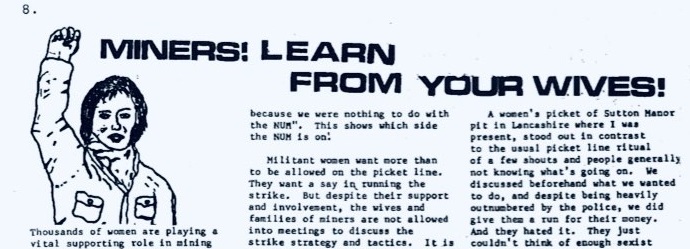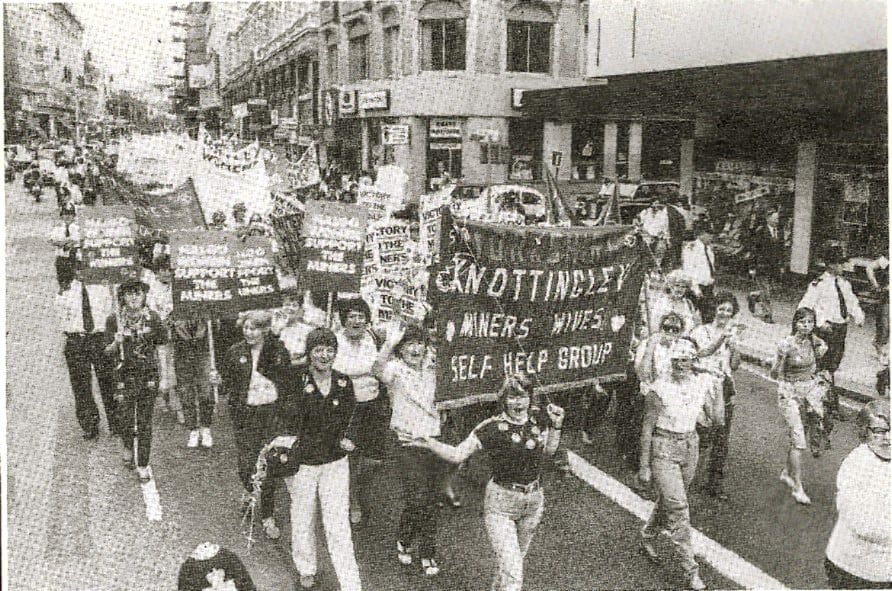
On the 40th anniversary of the Battle of Orgreave, we re-publish an article by the revolutionary group ‘Wildcat’ from the time on the central role of women to the success and extension of the strike towards its wider generalisation. A lesson that still inspires us.
Miners! Learn from your wives!

Thousands of women are playing a vital supporting role in mining areas. Without this involvement initiated by the women themselves miners would have been in a far weaker position to fight. As a woman canteen worker at Parkside pit said: “it mustn’t be forgotten that this strike wouldn’t have lasted more than three months without the self sacrifice of the miners wives and the participation of thousands of women in support groups”.
However, many NUM branches have refused to give money to the kitchens. Women from Fitzwilliam in Yorkshire say that they haven’t had a penny from the union.
Other branches have tried to impose strict conditions on the way money is used in the kitchens, to make sure the women know who’s boss. Women from Upton Miners support Group refused NUM money. They said “they wanted to give a donation on condition that they had to say in the menu! But we are answerable to nobody!”. At Tower Lodge in Hirwaun, Wales, NUM officials insisted that £100 collected by the women had to go to them instead. A miners wife told how “it’s like working with the Mafia. Terry Thomas (Vice President of South Wales NUM) came chasing after the money, and I wouldn’t be surprised if Neil Kinnock wasn’t far behind”.
When women want to go beyond the kitchen sink and go picketing, they have had an even harder time of it. At Wistow colliery miners themselves organised a picket of the local power station, inviting all their supporters along. A miner described what happened: “The NUM officials came down and told us to leave because the pickets had not been organised by the NUM and not all the pickets were NUM members. They also told the female pickets to get back to the soup kitchens ‘where they belonged’. One official went over to the police lines, inviting them to deal with us as they wished, because we were nothing to do with the NUM”. This shows which side the NUM is on!
Militant women want more than to be allowed on the picket line. They want a say in running the strike. But despite their support and involvement the wives and families of miners are not allowed into meetings to discuss the strikes strategy and tactics. It is vital that everyone who is actively supporting the strike is treated as equal in taking decisions about what to do and how to conduct it. Women from a Welsh pit village were told why they were banned from strike committee meetings – they had criticised the running of the strike, whereas the men were afraid to criticise “their own” leaders.
Why are union officials so hostile to women becoming more actively involved in the strike? This demand challenges the very heart of trade unionism. For once you let the miners wives into the branch meetings, and elect them onto strike committees, a precedent is established. Once non-miners are allowed to fully participate in the strike, the way is open for more and more people to be drawn into the struggle until what you have is no longer a trade union dispute but a mass strike! In this situation, union leaders would lose any special claim to authority. They recognise this threat to their power. They are afraid of women activists who bluntly refuse to do what they tell them. No wonder they tell the women to “get back to the kitchens”.
Women’s Pickets
Women who want to go picketing have met other problems. If they are the wives of militant miners who have already been arrested, they are reluctant to risk arrest as well, especially with children to look after. There is no reason why this should be organised by women , men on strike should take their share of caring for the children and let the women go picketing. Not just because everyone should be involved, but also women make very good pickets. For many it is their first experience of apicket line but they know what to do.
A women’s picket of Sutton Manor pit in Lancashire where I was present, stood out in contrast to the usual picket line ritual of a few shouts and people generally not knowing what’s going on. We discussed beforehand what we wanted to do and despite being heavily outnumbered by the police we did give them a run for their money. And they hated it! They just couldn’t think of enough sexist insults to fling at us there was a feeling of solidarity and collectivity that comes from struggling together. Without the union leaders and union traditions to tell them how to behave, which the men have, women are able to simply do what they decide to be done.
Wildcat does not support the aims of the Greenham movement, but pickets can learn from their organisation. The women at Greenham Common in 1982 and 1983 had no officials to say what they could do. They organised several hundred people around an 11 mile perimeter fence at night keeping one stop ahead of the police by using walkie-talkie radios, organising actions through group delegates to small central planning meetings making sure that all participants knew what was going on and everyone playing their part, however small.
What people involved in the miners strike have learnt, that the Greenham women never did, is the need to respond to state violence with our own violence. As one miners wife puts it: “I’ve always respected the police, but I’ll tell you what, I’ll watch a Bobby being kicked to death in the street in the future and I’ll walk across to the other side. They show their true colours now.”
Far from being the weakest section of the working class, unable to fight back against the bosses onslaught because they are marginalised, women have shown time and again that it is their very lack of involvement in the organisations which hold men back, that enables them to organise themselves and carry out their own decisions and actions. This puts them at the forefront of working class struggle. If miners are to win, they must learn from their wives and mothers, girlfriends and daughters.
